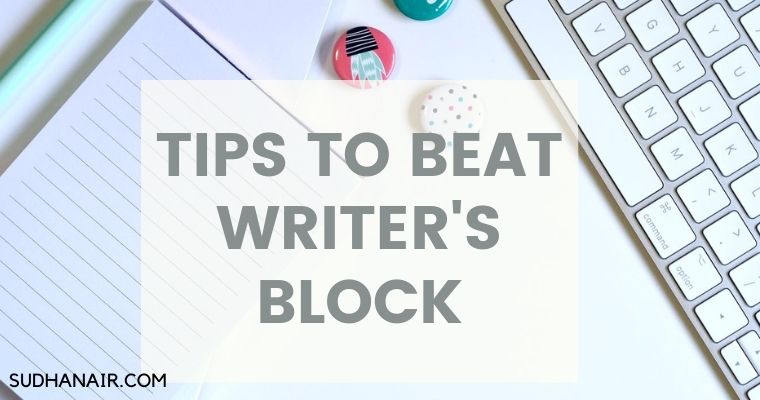Are you often hit by writer’s block?
These days, writer’s block has become synonymous with being a writer. Many writers talk of creative block.
Writer’s block is the condition of being unable to think of what to write or how to proceed with writing. A writer experiences a creative slowdown or burnout and is unable to produce new work or finish the work she has started.
The history of writer’s block dates to when the term was coined by Edmund Bergler, a disciple of Sigmund Freud, in the 1940s. Bergler’s theory was that a writer’s block is “the unconscious wish to defeat one’s conscious aims, and to enjoy that self-constructed defeat.”
There could be many causes to writer’s block including a lack of creative freedom, comparison to others, the need for external validation, the pursuit of perfection, and life events/burnouts/deadlines/external pressure, etc.
Prolific writer, Asimov, is said to have published 500 books and never suffered from writer’s block.
A solution to overcome writer’s block may be that you just need to write.
You may wonder what to write when you have writer’s block. A writer’s block may seem paralyzing, but more often than not, it can be averted or simply avoided by using some simple hacks.
What you need are actionable tools to get past writer’s block.
Here are 5 tips to beat writer’s block.
This post contains links to the Amazon affiliate program. As an Amazon Associate, I earn from qualifying purchases.

1. Switch to writing by hand
Writing longhand is actually therapeutic for the brain. As the fingers touch the pen and connect to the paper, it does something to free your brain to come up with sentences that flow with a certain vitality that could be lacking when you’re typing up the same words on a computer.
So, every time you feel disconnected from your writing, pick up a pen and a notebook and write down those thoughts or the scene that you were thinking about directly on paper.
Let the words flow freely and continue writing as you feel inspired.
Trust me, you’ll feel much better after the writing session, and when you read back what you’ve written, you’ll be sure to find some gems and nuggets that you can transfer to your computer.
2. Go for a walk
A walk is probably underrated as an exercise for allowing the creativity to flow but moving the body also helps to get out of stuck points of view and general stuckness in the writing.
Try to walk without listening to anything like music or a podcast. Simply walk and enjoy what’s around you. Let your mind wander and soak in the atmosphere and feel the energy of your surroundings. All you’re doing here is to give the brain free rein to come up with as many ideas as it wants to.
This type of mindful walking induces deep states of peace and relaxation and brings forth ideas that were in hiding.
3. Create a mind map
A mind map is simply a tool to get all your ideas down on paper and let them form their own connections to each other. Doing this exercise will help you draw out the connections between various ideas and let them seep into your brain so you can visualize them and form coherence from all the disparate ideas that may seem to be floating around.
This tool is similar to writing by hand but you are trying to also form connections with words, symbols, objects, pictures, drawings, etc which will activate the problem-solving part of your brain.
4. Try writing prompts every day
You need to be able to express yourself and be secure in your writing as Natalie Goldberg says in her book, Writing Down The Bones.
And, the more you write, the better you become. As you make writing a practice, you come to know yourself, feel the joy in expression, and trust what you think. Once you connect with your mind, you’re free. Read Goldberg’s book to free the writer within you!
A writing prompt also aids just that. It is a line or phrase that sets off your imagination and enables you to come up with random ideas based on the prompt you are using, which in turn enables you to write freely.
Writing prompts are a good exercise for your writing muscles. You can use this practice daily before you start your actual writing so that you feel warmed up and ready to hit the page immediately.
I’ll provide some examples of writing prompts in a separate blog.
5. Journal in the morning when your mind is fresh
I follow Julia Cameron’s advice in her book, The Artist’s Way, to produce three pages of stream of consciousness writing by longhand first thing every morning. She calls it the “morning pages”.
Doing the morning pages really brings out all my troubled thoughts on paper so that my mind is free to write the stuff that really matters. Try it and see how it works!
When I first began writing three pages, I never thought it would work but slowly as I kept at it, my writing started flowing more easily because my mind was freeing up. When all the crap that was in my mind had been transferred to paper, what I had left when I went into my actual writing were pure words, ideas, scenes, and writing that was free of limitations, worries, judgments. It was pure gold!
I also use Cameron’s advice to find solutions to the problems that may have been plaguing me. For instance, if I’ve been trying to think of a scene and am feeling stuck, I just pour all of those questions into the three morning pages, and somehow, as if by magic, some solution emerges. Again, try it, and see what works for you.
For free writing, you could also keep a dream journal for writing out your thoughts and dreams as Graham Greene did.
Books that will help you beat writer’s block and start writing again
Check out these amazing books:
The Artist’s Way By Julia Cameron
Writing Down The Bones by Natalie Golberg
Try all these tips to beat writer’s block and let me know if they work.
You can email me at sudha@sudhanair.com.



